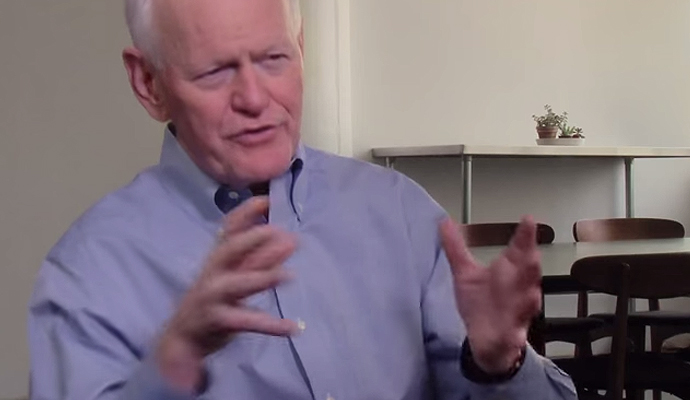Finding Meaning at Work
Earlier this year, as massive corporate downsizing emerged as a hot political issue, Secretary of Labor Robert B. Reich said that it was time for corporations to do "some soul searching."
Mr. Reich's premise that an entity as traditionally impersonal as a corporation has a soul to search may well have tapped into an emerging trend in American business: the search for meaning and spirituality in the workplace.
At the Fetzer Institute, a foundation specializing in research and education in mind/body health issues in Kalamazoo, Mich., for example, more than 60 members of Dow Corning's legal department have spent part of the past year attending seminars on developing the inner self.
David Sluyter, program director at Fetzer, said the participants have done a series of exercises, including writing autobiographies, keeping journals and seeking spiritual fulfillment through solitude and reflection. "The idea is that it is not just what you know that counts, but the sense of integrity you bring to your work," Mr. Sluyter said.
The idea of spirituality playing a role in an environment fixated on quarterly earnings and shareholder value may appear to be the ultimate paradox. And in a period of huge layoffs and corporate restructurings, most academics and organizational psychologists agree that workers have become disaffected and cynical about their employers, suddenly realizing that the once-presumed social contract between companies and workers has dissolved forever.
Yet despite that rift, or perhaps because of it, a movement toward finding spirituality and fulfillment at work is quietly coming to life. Observers like Mr. Sluyter are hesitant to call it a trend just yet. "This is a very fledgling movement at this point," he said. "I wouldn't say a lot of companies have come to us about this. It doesn't have mass appeal and it's not for everybody. You need a readiness for it because you can't sell it. It's something people have to want."
At Fetzer, however, there is a strong belief that this is something people are going to want. A survey on values conducted in October 1995 by Dr. Paul H. Ray, a behavioral researcher for Fetzer and a similar organization, the Institute of Noetics Sciences, revealed an emerging segment of the population, a group Dr. Ray termed "cultural creatives," who have "values that are more idealistic and spiritual, have more concern for relationships and psychological development, are more environmentally concerned and are more open to creating a positive future." The survey estimated that 24 percent of the adult population, or more than 40 million people, now embrace some or all of these philosophies.
The recent surge in popularity of books and seminars on spirituality and the soul underscores this trend in private life. But now the feeling is growing that people are seeking meaning in the full context of their lives, not just within family or religious settings.
"Part of this is recognizing that there is a core need within individuals to bring their entire selves to the workplace, not to turn off their heart and soul when they go to work," said John Renesch, editor and publisher of New Leaders Business Press in San Francisco.
Already, what some might call "New Age" leaders -- including Tom Chappell of Tom's of Maine, Anita Roddick, founder and chief executive of the Body Shop, and Susie Tompkins of Esprit -- have purposefully embraced the idea of organizations with soul. And even traditional business leaders, such as Southwest Airlines' chief executive, Herb Kelleher, have spoken out about the role of a spiritual force within their companies. While commenting on the powerful bond between his company and its workers, Mr. Kelleher told Fortune magazine that his airline had "a patina of spirituality."
Jay Conger, a professor at the University of Southern California's business school and a noted author and researcher on leadership, said that over the past decade, he has studied countless business leaders and found a common thread.
"The real leaders most deeply love what they do," Mr. Conger said. "It brings a tremendous sense of meaning and their lives are characterized by lots of growth."
In that context, Mr. Conger said that many leaders he interviewed would "articulate their own spirituality," which moved him to look into the concept further and write a book, "Spirit at Work: Discovering the Spirituality in Leadership" (Jossey-Bass, 1994).
Mr. Conger and others in the field are quick to point out that their use of the term "spirituality" in this context has little to do with traditional religious teachings, although many deeply religious business leaders tend to quietly encourage the spread of such teachings in their organizations.
In his work as a leadership consultant, Mr. Conger discovered that what is missing in companies today "is a sense of community and that the mission is more than return on investment. The best and most charismatic leaders create a lot of meaning for what the organization is doing."
Steven Jobs, the youthful co-founder of Apple Computer, for example, used to characterize the mission of Apple as "the revolutionizing of the way children will learn in this world," Mr. Conger recalled. "Mary Kay of Mary Kay Cosmetics spoke of giving women the self-esteem they deserve."
Jim Dawson, the 61-year-old chief executive of Zebco, a fishing tackle manufacturer based in Tulsa, Okla., has overseen 14 consecutive years of sales and earnings growth and has watched the company, a division of Brunswick Industries, triple in size just since 1990. Mr. Dawson, a devout Christian, says that his spirituality and the commitment that the company makes to its employees are at the root of Zebco's ability to ward off fierce Asian competition and remain the country's No. 1 tackle maker. All of Zebco's American competitors are either out of business or were forced to go offshore to make their products.
"We don't make [spirituality] a big deal," Mr. Dawson said, "but at the same time, we don't mind taking a position. You have to recognize that some people have spiritual problems and you have to deal with them just like any other issue at work."
Mr. Dawson pushed hard to instill a sense of pride in quality, workmanship and service, and challenged his employees to find a way to fight off competition from the Far East, where workers are paid an average of 41 cents an hour. Zebco was named Wal-Mart's "vendor of the year" in both 1992 and 1993.
"Frankly, if people are thinking about harnessing the enthusiasm of their work force, there are only a small percentage who are really turned on by increasing return on investment," Mr. Conger continued. "But if you look at those who are really good at what they do, they love the product or the service and are impassioned and deeply empowered by what they are doing."
In his research, Mr. Conger found that one of the key reasons for the emergence of the spirituality movement in business is the ascendancy of the workplace "as the primary community for many people."
Fifty years ago, he said, individuals were generally equally involved in four communities: the extended family, including grandparents, aunts, uncles and cousins; the civic community, namely political groups, school boards, Boy Scouts, Rotary club activities and the like; church and temple; and the workplace.
Mr. Conger suggested that the role of the first three communities has changed, sharply diminishing their impact. Extended families are scattered across the country; even worse, huge numbers of immediate families have been broken by divorce. Civic activities are on the wane, fallen prey to perpetually busy lives and cynicism about politics and getting involved in general. And religious affiliations have disappeared for many, who have lost touch over the years with rules that seem to be less and less related to modern life.
That leaves the workplace as the core of many people's lives. Driven by a seemingly insatiable desire for money and material goods, the baby boom generation thought nothing of 60-to-70-hour workweeks and a life fully immersed in a job. Mr. Conger recalled a survey of U.C.L.A. freshmen in 1971 in which 40 percent said their central objective was to be very well off financially. When the same question was posed to the entering class in 1993, nearly 75 percent answered that way.
But for many, the rush to acquire has begun to sour. "We have a lot of material possessions and we've spent a lot of time and effort to get them," Mr. Conger said. "But they don't seem to improve our lives or overall sense of well-being. The boomers are finding out that materialism is not the answer."
People now are desperately searching for a sense of community, and have a strong desire to feel a consistency in their lives.
"If you are holding a set of values," said Mr. Sluyter of the Fetzer Institute, "you want to live it throughout your life, rather than fracturing it off and living a different set of values at work. Often we're asked to put aside our values at work and we're reaching a point where we don't want to be divided anymore."
David Lewin, vice dean and faculty director of the M.B.A. program at U.C.L.A.'s Anderson Graduate School of Business, has studied and written about human resource issues and the meaning of work.
"I don't think we are moving all that much in the direction of employees trying to get a larger meaning out of work," Mr. Lewin declared. "Partly because of decisions to reduce work forces and partly because of decisions to acquire and diversify businesses, a lot of factors mitigate an emphasis on getting meaning from work, especially among middle-aged and older workers."
He acknowledged, however, that a younger, high-tech work force, pushing the envelope at companies like Microsoft and Netscape, is indeed finding a larger meaning in their jobs. These recent graduates are willing to work endless hours and dedicate themselves to a product niche and corporate growth with something like religious zeal.
But, Mr. Lewin pointed out, this search for meaning in work does not preclude a search for high pay. "Getting meaning out of work and getting the material goods as a result don't conflict," he said. "Most of these people in their 20's would not be working at a company if they were not offered market rates and stock options. But once the money issue is satisfied, a higher need kicks in, like self-esteem, self-actualization."
Indeed, Mr. Lewin's research on participatory team-based work shows that people in that setting have far more decision-making power and more to say about how work is defined.
"A lot of the initiatives for participatory team-based work," Mr. Lewin said, "are based on the principle that employees want to get more meaning out of work." ![]()
| Authors
Glenn Rifkin, glennrifkin@worldnet.att.net Glenn Rifkin has covered technology for the New York Times and has written for the Harvard Business Review and Fast Company. He is coauthor of Radical Marketing (HarperBusiness, 1999) and The CEO Chronicles (Knowledge Exchange, 1999). |



